Chapter 2 Polynomials
Class 10th R. S. Aggarwal Maths Solution
CBSE Class 10 Maths
R. S. Aggarwal Solution
Polynomials Exercise Ex. 2A
Solution 1

Solution 2

Solution 3

Solution 4
2x2 - x - 6 = 0
⇒ 2x2 - 4x + 3x - 6 = 0
⇒ 2x(x - 2) + 3(x - 2) = 0
⇒ (x - 2)(2x + 3) = 0
⇒ (x - 2) = 0 or (2x + 3) = 0
![]()
So, the zeroes of the given quadratic polynomial are 2
and ![]()
Sum of the zeros 
Product of the zeros ![]()
Solution 5
We have

Solution 6

Solution 7

Solution 8

Solution 9

Solution 10

Solution 11
5x2 + 10x = 0
⇒ 5x(x + 2) = 0
⇒ 5x = 0 or (x + 2) = 0
⇒ x = 0 or x = -2
So, the zeroes of the given quadratic polynomial are 0 and -2.
Sum of the zeros 
Product of the zeros ![]()
Solution 12
Let


Solution 13
p(x) = 2x2 + 5x + k
Here, a = 2, b = 5 and c = k
α + β = ![]() and αβ =
and αβ = ![]()
α2 + β2 + αβ = ![]() …. Given
…. Given
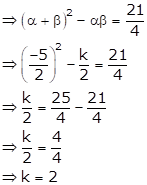
Solution 14
![]()
Solution 15

Solution 16

Solution 17
Let α = 2 and β = -6
Sum of zeros = α + β = 2 + (-6) = -4
Product of zeros = αβ = 2(-6) = -12
So, the required quadratic polynomial is
x2 - (α + β)x + αβ = x2 + 4x - 12
Here, a = 1, b = 4 and c = -12
Sum of the zeros 
Product of the zeros ![]()
Solution 18

Solution 19

Solution 20
Since  and
and  are
zeros of
are
zeros of  ,
we have
,
we have


Solution 21
Let ![]() and
and
![]() be
the zeros of polynomial
be
the zeros of polynomial ![]() .
.
Then,
![]()
Now,
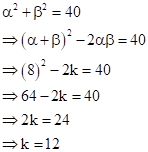
Polynomials Exercise Ex. 2B
Solution 1
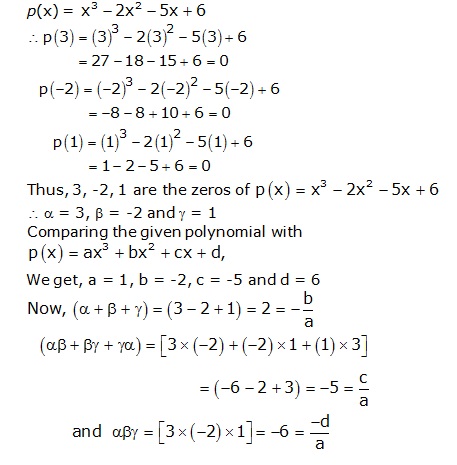
Solution 2
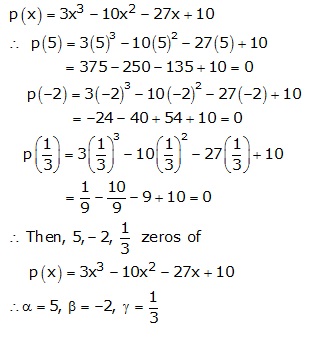
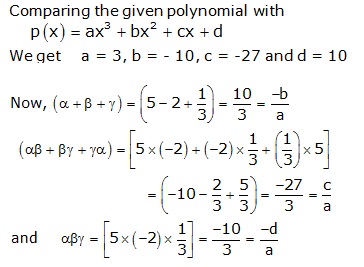
Solution 3

Solution 4

Solution 5

Solution 6

Solution 7

Solution 8

Solution 9

Solution 10
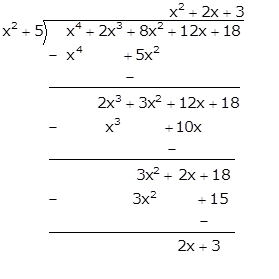
Here, remainder = 2x + 3 = px + q
⇒ p = 2 and q = 3
Solution 11

Solution 12

Solution 13
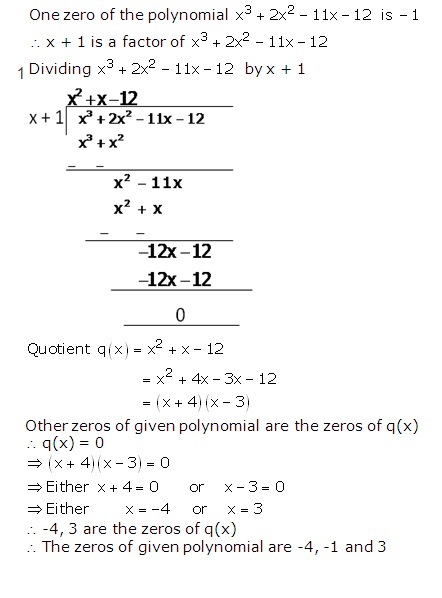
Solution 14
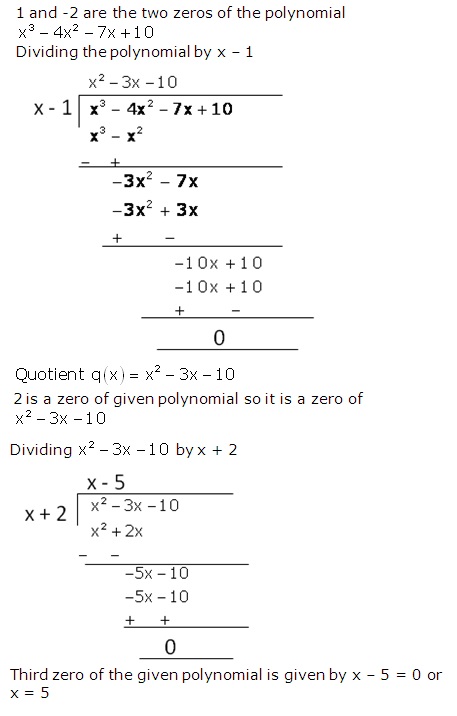
Solution 15
![]()
Solution 16
![]() and
and
![]() are
the zeros of the polynomial
are
the zeros of the polynomial ![]() .
.
Then,
![]() will divide the given polynomial completely.
will divide the given polynomial completely.
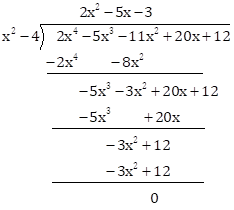
Now,
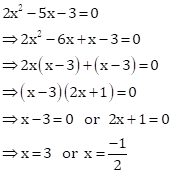
Therefore, the zeros of the given polynomial are
![]() .
.
Solution 17
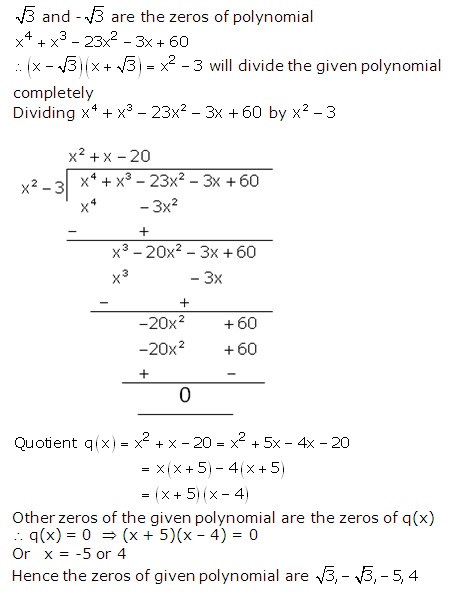
Solution 18

Solution 19
Here, f(x) = x4 + x3 - 14x2 - 2x + 24
Since, √2 and -√2 are two zeros of f(x)
⇒ (x - √2) and (x + √2) is a factor of f(x).
⇒ (x - √2) and (x + √2) = x - 2 is a factor of f(x).
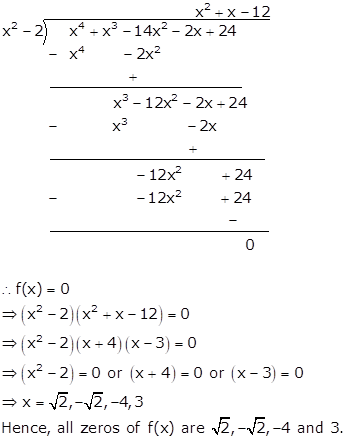
Solution 20
Here, f(x) = 2x4 - 13x3 + 19x2 + 7x - 3
Let α = (2 + √3) and β = (2 - √3). Then,
α + β = (2 + √3).+ (2 - √3) = 4
αβ = (2 + √3).(2 - √3) =4 - 3 = 1
So, the quadratic polynomial whose roots are α and β is given by
x2 - (α + β)x + αβ = x2 - 4x + 1
⇒ x2 - 4x + 1 is a factor of f(x).
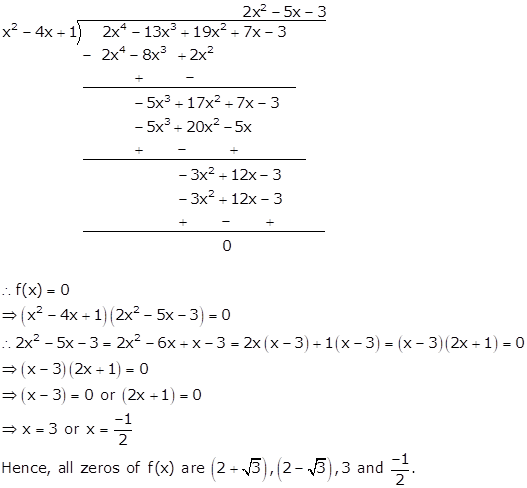
Solution 21
f(x) = 3x3 + 16x3 + 15x - 18
![]() is one zero of f(x).
is one zero of f(x).
![]() is
a factor of f(x).
is
a factor of f(x).
⇒ (3x - 2) is also a factor of f(x).
Now,

Hence, the zeros of the given polynomial are  .
.
Solution 22
Here, f(x) = 2x4 - 3x3 - 3x2 + 6x - 2
1 and ![]() are two zeros of f(x).
are two zeros of f(x).
⇒ ![]() is a factor of f(x).
is a factor of f(x).
⇒![]() is
a factor of f(x).
is
a factor of f(x).
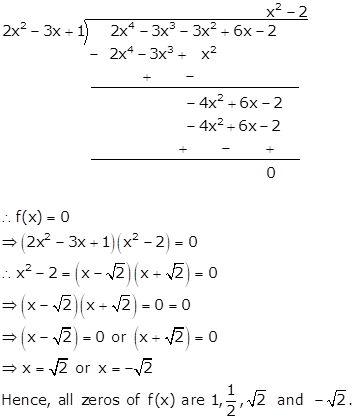
Solution 23
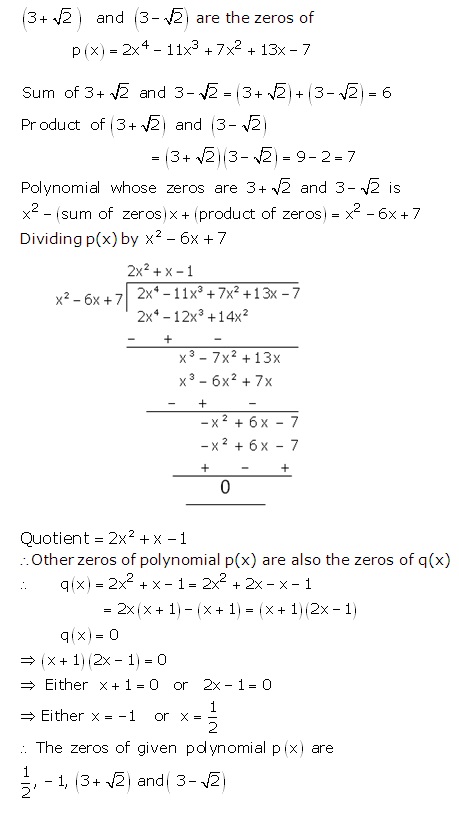
Polynomials Exercise Ex. 2C
Solution 1

Solution 2

Solution 3

Solution 4

Solution 5

Solution 6

Solution 7

Solution 8

Solution 9

Solution 10

Solution 11

Solution 12

Solution 13

Solution 14

Solution 15

Solution 16

Solution 17
If f(x) and g(x) are any two polynomials with g(x) ≠ 0, then we can always find polynomials q(x) and r(x) such that f(x) = q(x)g(x) + r(x),
where r(x) = 0 or degree r(x) < degree g(x).
Solution 18

Solution 19

Solution 20

Solution 21

Solution 22

Solution 23

Solution 24

Solution 25

Polynomials Exercise MCQ
Solution 1
Correct answer: (d)
An expression of the form p(x) = a0 + a1x + a2x2 + ….. + anxn, where an ≠ 0, is called a polynomial in x of degree n.
Here, a0, a1, a2, ……, an are real numbers and each power of x is a non-negative integer.
![]()
Solution 2
Correct answer: (d)
An expression of the form p(x) = a0 + a1x + a2x2 + ….. + anxn, where an ≠ 0, is called a polynomial in x of degree n.
Here, a0, a1, a2, ……, an are real numbers and each power of x is a non-negative integer.
![]()
Solution 3

Solution 4

Solution 5

Solution 6

Solution 7

Solution 8

Solution 9

Solution 10

Solution 11

Solution 12

Solution 13
Correct option: (c)
 be
the zeros of
be
the zeros of  .
.
Then,

Solution 14

Solution 15

Solution 16

Solution 17

Solution 18

Solution 19

Solution 20

Solution 21

Solution 22

Solution 23

Solution 24

Solution 25

Solution 26

Solution 27

Solution 28
![]()
Polynomials Exercise Test Yourself
Solution 1

Solution 2

Solution 3

Solution 4

Solution 5

Solution 6

Solution 7

Solution 8

Solution 9

Solution 10

Solution 11

Solution 12

Solution 13

Solution 14

Solution 15

Solution 16

Solution 17

Solution 18

Solution 19

Solution 20
